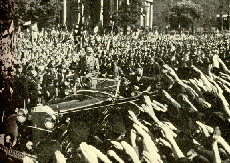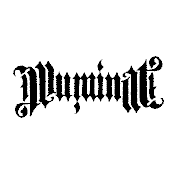| They
Though They Were Free
by Milton Mayer,
The Germans, 1938-45 (Chicago: University of
Chicago Press, 1955)
(Posted here: Jan 08, 2006)
 "What
no one seemed to notice was the ever widening gap between the
government and the people. And it became always wider.....the
whole process of its coming into being, was above all diverting,
it provided an excuse not to think....for people who did not
want to think anyway gave us some dreadful, fundamental things
to think about.....and kept us so busy with continuous changes
and 'crises' and so fascinated.....by the machinations of the
'national enemies,' without and within, that we had no time to
think about these dreadful things that were growing, little by
little, all around us..... "What
no one seemed to notice was the ever widening gap between the
government and the people. And it became always wider.....the
whole process of its coming into being, was above all diverting,
it provided an excuse not to think....for people who did not
want to think anyway gave us some dreadful, fundamental things
to think about.....and kept us so busy with continuous changes
and 'crises' and so fascinated.....by the machinations of the
'national enemies,' without and within, that we had no time to
think about these dreadful things that were growing, little by
little, all around us.....
"Each step was so small, so inconsequential, so well explained
or, on occasion, 'regretted,' that unless one understood what
the whole thing was in principle, what all these 'little
measures'.....must some day lead to, one no more saw it
developing from day to day than a farmer in his field sees the
corn growing.....Each act is worse than the last, but only a
little worse. You wait for the next and the next.
"You wait for one great shocking occasion, thinking that others,
when such a shock comes, will join you in resisting somehow. You
don't want to act, or even talk, alone.....you don't want to 'go
out of your way to make trouble.' But the one great shocking
occasion, when tens or hundreds or thousands will join with you,
never comes.
"That's the difficulty. The forms are all there, all untouched,
all reassuring, the houses, the shops, the jobs, the mealtimes,
the visits, the concerts, the cinema, the holidays. But the
spirit, which you never noticed because you made the lifelong
mistake of identifying it with the forms, is changed. Now you
live in a world of hate and fear, and the people who hate and
fear do not even know it themselves, when everyone is
transformed, no one is transformed.
"You have accepted things you would not have accepted five years
ago, a year ago, things your father.....could never have
imagined."
"The discrepancy between
the kind of society many Germans thought they were building and
the reality of the horror of the Third Reich presents one of the
most intriguing questions of our age. "How could it -- the
Holocaust -- have happened in a modern, industrialized, educated
nation? The genesis of my interest in the Third Reich lies in my
search for an answer to that enigmatic question. The excerpt
reproduced below is one of the most insightful I have yet
discovered. I share it with you - Pass it on - Lest we forget"
-- RCD Third Reich Roundtable
--------------------------------------------------------------------------------
"What no one seemed to notice," said a colleague of mine, a
philologist, "was the ever widening gap, after 1933, between the
government and the people. Just think how very wide this gap was
to begin with, here in Germany. And it became always wider. You
know it doesn't make people close to their government to be told
that this is a people's government, a true democracy, or to be
enrolled in civilian defense, or even to vote. All this has
little, really nothing to do with knowing one is governing.
What happened here was the gradual habituation of the people,
little by little, to being governed by surprise; to receiving
decisions deliberated in secret; to believing that the situation
was so complicated that the government had to act on information
which the people could not understand, or so dangerous that,
even if he people could understand it, it could not be released
because of national security. And their sense of identification
with Hitler, their trust in him, made it easier to widen this
gap and reassured those who would otherwise have worried about
it.
"This separation of government from people, this widening of the
gap, took place so gradually and so insensibly, each step
disguised (perhaps not even intentionally) as a temporary
emergency measure or associated with true patriotic allegiance
or with real social purposes. And all the crises and reforms
(real reforms, too) so occupied the people that they did not see
the slow motion underneath, of the whole process of government
growing remoter and remoter.
"You will understand me when I say that my Middle High German
was my life. It was all I cared about. I was a scholar, a
specialist. Then, suddenly, I was plunged into all the new
activity, as the universe was drawn into the new situation;
meetings, conferences, interviews, ceremonies, and, above all,
papers to be filled out, reports, bibliographies, lists,
questionnaires. And on top of that were the demands in the
community, the things in which one had to, was "expected to"
participate that had not been there or had not been important
before. It was all rigmarole, of course, but it consumed all
one's energies, coming on top of the work one really wanted to
do. You can see how easy it was, then, not to think about
fundamental things. One had no time."
"Those," I said, "are the words of my friend the baker. "One had
no time to think. There was so much going on."
"Your friend the baker was right," said my colleague. "The
dictatorship, and the whole process of its coming into being,
was above all diverting. It provided an excuse not to think for
people who did not want to think anyway. I do not speak of your
'little men', your baker and so on; I speak of my colleagues and
myself, learned men, mind you. Most of us did not want to think
about fundamental things and never had. There was no need to.
Nazism gave us some dreadful, fundamental things to think about
- we were decent people - and kept us so busy with continuous
changes and 'crises' and so fascinated, yes, fascinated, by the
machinations of the 'national enemies', without and within, that
we had no time to think about these dreadful things that were
growing, little by little, all around us. Unconsciously, I
suppose, we were grateful. Who wants to think?
|


 "What
no one seemed to notice was the ever widening gap between the
government and the people. And it became always wider.....the
whole process of its coming into being, was above all diverting,
it provided an excuse not to think....for people who did not
want to think anyway gave us some dreadful, fundamental things
to think about.....and kept us so busy with continuous changes
and 'crises' and so fascinated.....by the machinations of the
'national enemies,' without and within, that we had no time to
think about these dreadful things that were growing, little by
little, all around us.....
"What
no one seemed to notice was the ever widening gap between the
government and the people. And it became always wider.....the
whole process of its coming into being, was above all diverting,
it provided an excuse not to think....for people who did not
want to think anyway gave us some dreadful, fundamental things
to think about.....and kept us so busy with continuous changes
and 'crises' and so fascinated.....by the machinations of the
'national enemies,' without and within, that we had no time to
think about these dreadful things that were growing, little by
little, all around us.....